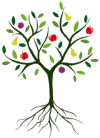Eden®
Malus domestica Eden is a new dual-purpose apple from Canada with a unique characteristic - the flesh does not turn brown when the apple is cut, making it ideal for use in fruit salads.
Eden is pleasant to eat fresh, and the flavour is quite similar to the popular Spartan apple - crisp and sweet (in fact they share a common ancestry).
When cooked, Eden turns into a puree, and does not need extra sugar.
This is also an excellent variety for juicing, partly because the juice stays clearer than most other varieties, but also because of the pleasant sweet flavour of the juice. The juice is a clear pale golden green colour.
Eden apple trees for sale
RF11-year bare-root
tree
on M26 rootstock£34.95
Mature height: 2m-3.5m after 10 years
Suitable for a semi-dwarf apple tree, a medium apple spindlebush, a medium apple fan or espalier, a large apple cordon or U-cordon. Available next season
RF21-year bare-root
tree
on MM106 rootstock£34.95
Mature height: 3m-5m after 10 years
Can be trained on as a large free-standing apple tree, a half-standard apple tree, a large apple fan or espalier, or a pleached apple tree. Available next season
Growing and Training
Eden is heavy-cropping and generally easy to grow.
It ripens relatively late in the season, and the apples do not fall when ripe, but hang on the tree (known as "persistence") well into early winter. In Canada this feature is being exploited by cider producers to make "ice cider", where the apples are allowed to freeze on the tree before being picked for cider production.
Recommended pollinators for Eden apple trees
Eden is not self-fertile, so you will need another different but compatible variety planted nearby in order to produce fruit.
The following varieties are good pollinators for Eden.
If you are not sure about pollination requirements don't hesitate to ask us.
BountifulBountiful is an easy-to-grow cooking apple, it retains its shape when cooked, fairly sweet for a cooker.
GreensleevesGreensleeves is a reliable and popular mid-season green/yellow apple, easy to grow and productive.
Egremont RussetEgremont Russet is the most popular English russet variety, and a good apple tree for the garden.
BardseyA hardy disease-resistant apple, discovered growing on an island off the west coast of Wales.
Keswick CodlinKeswick Codlin is a popular early-season cooking apple, easy to grow, and productive in most climates.
Stirling CastleA traditional Scottish cooker from the Victorian era, with a good sharp flavour.
Red SentinelMalus Red Sentinel has classic white blossom and a profusion of tiny scarlet persistent fruits.
History
Eden was developed in Canada in the 1970s, and is distantly descended from McIntosh, an old 19th century Canadian variety. The maroon-coloured skin and bright white flesh of McIntosh are frequently found in its descendants, including Eden. The new variety languished, un-named, at the research station until 2000 when a researcher noticed the flesh was remarkably non-browning - the scientific term is non-oxidising. It was then named as Eden and has entered commercial production on a small scale.
Eden characteristics
- Gardening skillAverage
- Fruit persistencePersistent
- Self-fertile?Not self-fertile
- Pollinating othersAverage
- Pick seasonLate
- Picking monthOctober
- Picking periodearly October
- Keeping2-3 weeks
- Food usesEating freshCulinaryJuiceDryingDual purpose
- Country of originCanada
- Period of origin1950 - 1999
- Fruit colourRed / Green
You might also like these varieties
Queen of the RealmA new apple variety, released in 2022 to celebrate the Queen's platinum jubilee.
More about apple trees
Apples are very versatile, and all varieties can be eaten or used in the kitchen. However varieties specifically grown as eating apples tend to have the best flavours for eating raw.
The main thing to decide when choosing an eating apple is when you intend to eat the apples. Early season apples are typically ready in August, and generally don't keep very long. Mid-season apples are ripe in early September, while late-season apples start to become ripe in late September and October. Many of the late-season varieties can also be stored in a fridge or cold shed for several months into the winter.
Some apple varieties are self-fertile, but most are not. However in most areas of the UK you do not need to worry whether your apple trees are self-fertile or not, as there will be other apple trees in nearby gardens to help with pollination.
